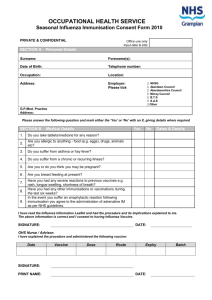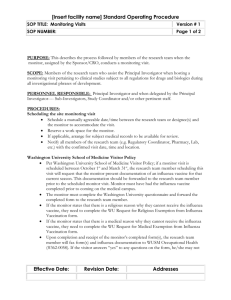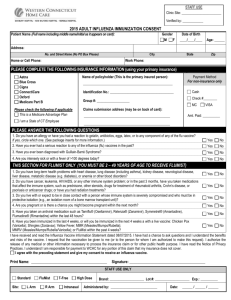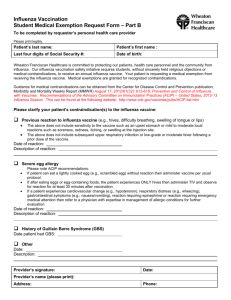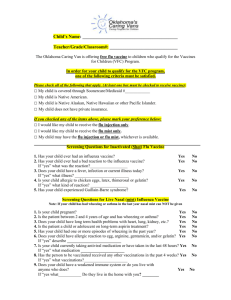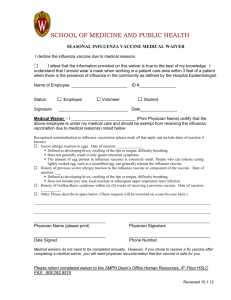Inactivated Influenza (Flu) Vaccine
advertisement
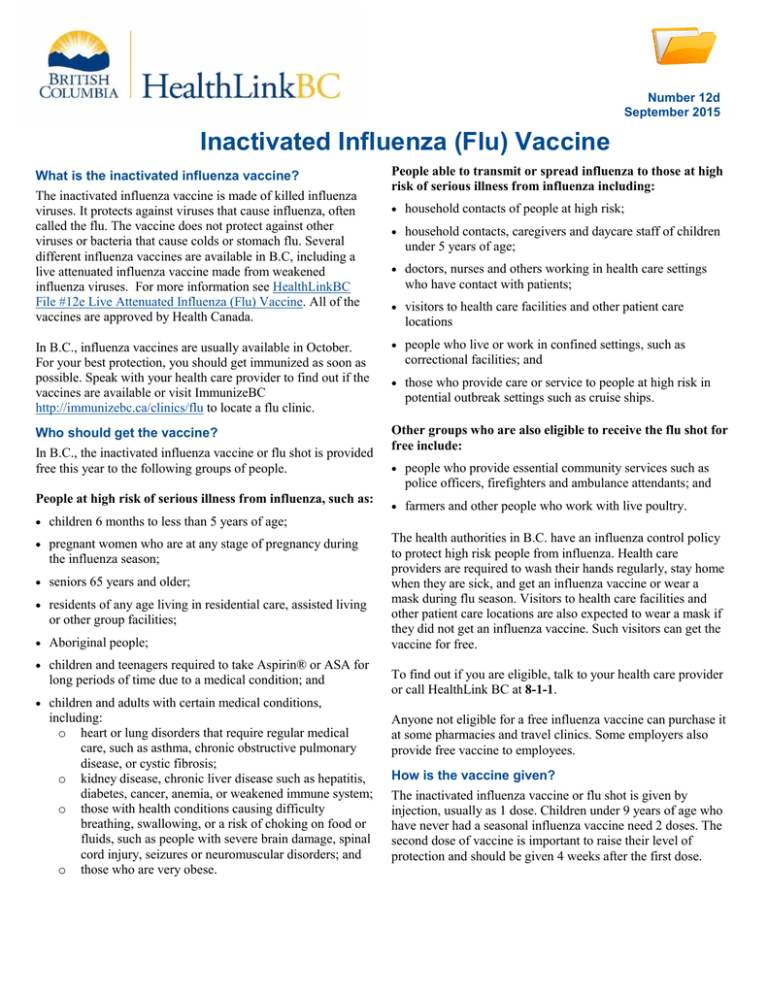
Number 12d September 2015 Inactivated Influenza (Flu) Vaccine What is the inactivated influenza vaccine? The inactivated influenza vaccine is made of killed influenza viruses. It protects against viruses that cause influenza, often called the flu. The vaccine does not protect against other viruses or bacteria that cause colds or stomach flu. Several different influenza vaccines are available in B.C, including a live attenuated influenza vaccine made from weakened influenza viruses. For more information see HealthLinkBC File #12e Live Attenuated Influenza (Flu) Vaccine. All of the vaccines are approved by Health Canada. People able to transmit or spread influenza to those at high risk of serious illness from influenza including: household contacts of people at high risk; household contacts, caregivers and daycare staff of children under 5 years of age; doctors, nurses and others working in health care settings who have contact with patients; visitors to health care facilities and other patient care locations In B.C., influenza vaccines are usually available in October. For your best protection, you should get immunized as soon as possible. Speak with your health care provider to find out if the vaccines are available or visit ImmunizeBC http://immunizebc.ca/clinics/flu to locate a flu clinic. people who live or work in confined settings, such as Who should get the vaccine? Other groups who are also eligible to receive the flu shot for free include: In B.C., the inactivated influenza vaccine or flu shot is provided free this year to the following groups of people. correctional facilities; and those who provide care or service to people at high risk in potential outbreak settings such as cruise ships. people who provide essential community services such as police officers, firefighters and ambulance attendants; and People at high risk of serious illness from influenza, such as: farmers and other people who work with live poultry. children 6 months to less than 5 years of age; pregnant women who are at any stage of pregnancy during the influenza season; seniors 65 years and older; residents of any age living in residential care, assisted living or other group facilities; Aboriginal people; children and teenagers required to take Aspirin® or ASA for long periods of time due to a medical condition; and children and adults with certain medical conditions, including: o heart or lung disorders that require regular medical care, such as asthma, chronic obstructive pulmonary disease, or cystic fibrosis; o kidney disease, chronic liver disease such as hepatitis, diabetes, cancer, anemia, or weakened immune system; o those with health conditions causing difficulty breathing, swallowing, or a risk of choking on food or fluids, such as people with severe brain damage, spinal cord injury, seizures or neuromuscular disorders; and o those who are very obese. The health authorities in B.C. have an influenza control policy to protect high risk people from influenza. Health care providers are required to wash their hands regularly, stay home when they are sick, and get an influenza vaccine or wear a mask during flu season. Visitors to health care facilities and other patient care locations are also expected to wear a mask if they did not get an influenza vaccine. Such visitors can get the vaccine for free. To find out if you are eligible, talk to your health care provider or call HealthLink BC at 8-1-1. Anyone not eligible for a free influenza vaccine can purchase it at some pharmacies and travel clinics. Some employers also provide free vaccine to employees. How is the vaccine given? The inactivated influenza vaccine or flu shot is given by injection, usually as 1 dose. Children under 9 years of age who have never had a seasonal influenza vaccine need 2 doses. The second dose of vaccine is important to raise their level of protection and should be given 4 weeks after the first dose. What are the benefits of getting the vaccine? The vaccine is the best way to protect against influenza, a serious and sometimes fatal infection. When you get immunized, you help protect others as well by reducing the spread of the influenza virus. What are the possible reactions after the vaccine? Common reactions to the inactivated influenza vaccine or flu shot include soreness, redness and swelling where the vaccine was given. Other symptoms can include fever, headache, aching muscles and fatigue that may last 1 to 2 days. Fewer than 1 in 20 people may have oculo-respiratory syndrome (ORS). Symptoms of ORS include red eyes and a cough and/or sore throat and/or hoarseness. The inactivated influenza vaccine cannot give you influenza because it contains killed influenza viruses that cannot cause infection. ® Acetaminophen or Tylenol can be given for fever or ® soreness. ASA or Aspirin should NOT be given to anyone under 20 years of age due to the risk of Reye Syndrome. For more information on Reye Syndrome, see HealthLinkBC File #84 Reye Syndrome. It is important to stay in the clinic for 15 minutes after getting any vaccine because there is an extremely rare possibility, less than 1 in a million, of a life-threatening allergic reaction called anaphylaxis. This may include hives, difficulty breathing, or swelling of the throat, tongue or lips. Should this reaction occur, your health care provider is prepared to treat it. Emergency treatment includes administration of epinephrine (adrenaline) and transfer by ambulance to the nearest emergency department. If symptoms develop after you leave the clinic, call 9-1-1 or the local emergency number. Children less than 6 months of age should not get the flu shot because the vaccine is not known to be effective at this age. There is no need to delay getting immunized because of a cold or other mild illness. However, if you have concerns speak with your health care provider. What is influenza? Influenza is an infection of the upper airway caused by the influenza virus. A person with influenza is at risk of other infections, including viral or bacterial pneumonia which is an infection of the lungs. Influenza spreads easily from person to person through coughing, sneezing, or having face-to-face contact. The virus can also spread when a person touches tiny droplets from a cough or sneeze on another person or object and then touches their eyes, mouth or nose before washing their hands. Mature Minor Consent It is recommended that parents or guardians and their children discuss consent for immunization. Efforts are first made to seek parental/guardian or representative consent prior to immunization. However, children under the age of 19, who are able to understand the benefits and possible reactions for each vaccine and the risk of not getting immunized, can legally consent to or refuse immunizations. For More Information For more information, see the following HeathLinkBC Files: HealthLinkBC File #12a Why Seniors Should Get the Inactivated Influenza (Flu) Vaccine HealthLinkBC File #12b Facts about Influenza (the Flu) HealthLinkBC File #12c Influenza (Flu) Immunization: Myths and Facts It is important to always report serious or unexpected reactions to your health care provider. Guillain-Barré Syndrome (GBS) is a rare condition that can result in weakness and paralysis of the body’s muscles. It most commonly occurs after infection, but in rare cases can also occur after some vaccines. GBS may be associated with influenza vaccine in about 1 per million recipients. Who should not get the inactivated influenza vaccine? Speak with your health care provider if you: had a life-threatening reaction to a previous dose of influenza vaccine, or any component of the vaccine (people with egg allergies can be safely immunized with the inactivated influenza vaccine); had severe oculo-respiratory syndrome after a previous flu shot; or developed Guillain-Barré Syndrome (GBS) within 8 weeks of getting any influenza vaccine without another cause being identified. HealthLinkBC File #12e Live Attenuated Influenza (Flu) Vaccine For more information on immunizations visit ImmunizeBC www.immunizebc.ca. For more HealthLinkBC File topics, visit www.HealthLinkBC.ca/healthfiles or your local public health unit. Click on www.HealthLinkBC.ca or call 8-1-1 for nonemergency health information and services in B.C. For deaf and hearing-impaired assistance, call 7-1-1 in B.C. Translation services are available in more than 130 languages on request.
